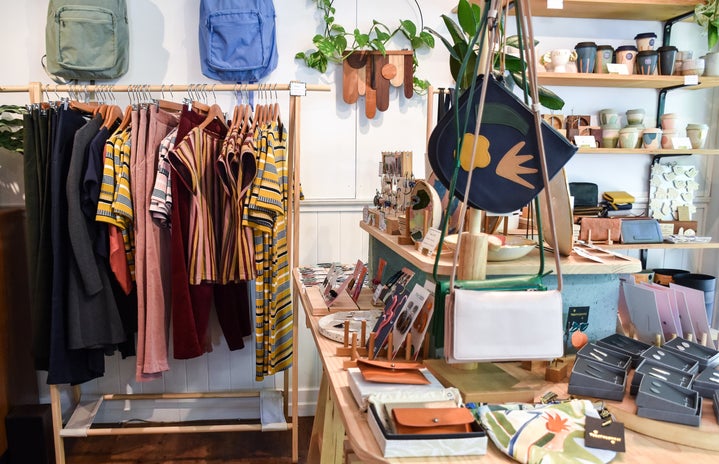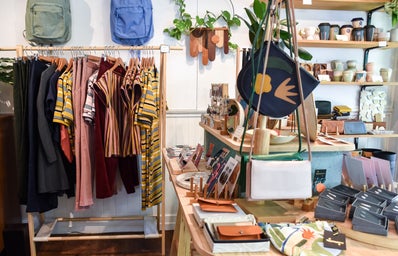Trigger Warning: Mentions Of Sexual Harassment
Social media algorithms make it a necessity for most of us to do what is trending. Be it Instagram reels that immediately start a new trend the moment they go viral or celebrity wedding looks that every other person wishes to recreate, everything puts a pressure on us—the Gen Zs and millennials—to remain up to date. None of us wish to be forgotten and visibility is expensive even for the wealthiest of influencers. However, the fashion industry knows how to capitalise on these changing trends and their impacts on our mindsets. Perhaps, that is why fast fashion, in today’s time, has become such an integral part of our everyday lives.
For those who might not know, fast fashion is a business model followed by numerous companies within the clothing industry to manufacture low-cost imitations of high-cost, branded clothes. In other words, it is an affordable recreation of catwalk trends which are, otherwise, almost unaffordable for most people. While a less expensive replication of runway looks doesn’t, in itself, appear as a major issue, fast fashion becomes a problem when we begin to analyse how the mass production of these outfits impacts the environment and the workers involved in the manufacturing processes.
To begin with, most fast fashion brands—including, but not limited to Boohoo (UK), Shein (China) and Emmiol (Hong Kong)—follow a model which is commonly referred to as “test and repeat”. Under this, small batches of newly popularised clothes are added on their websites on a daily basis with mass production being directly dependent on the saleability of items. The less popular outfits after being removed from the websites are then sent to landfills in heaps. Additionally, since most of these companies ship their products to customers across the globe, it is easier for them to further dump the returned items into landfills, much like the outdated ones. This is the case because the recirculation of returned and antiquated outfits is a more expensive option for these brands. Thus, over the past few years, not only has the mass production of these outfits depleted natural resources—an example of which includes 2700 litres of water being used to make each T-shirt—but has also severely harmed the environment.
Another fundamental problem with these companies is related to how much they exploit their workers. Boohoo, a UK based brand, has been known for selling clothes manufactured in factories setup in Faisalabad, an industrial city in Pakistan. In 2020, the workers there were said to be paid less than 29p an hour while having to work for shifts that could go on for 24 hours. A few months back, similar reports about Boohoo began making rounds. They suggested that it paid its workers less than £3.50–£4 per hour. Many of the reports also pointed out that the warehouse staff members referred to themselves as “slaves” because they were made to work in inhuman conditions in 32C heat. Some employees further stated that they constantly faced racial discrimination and sexual harassment at their places of work.
Due to these reasons, numerous environmental and fashion activists have started movements to actively boycott the said fast fashion brands. However, in spite of how much criticism Boohoo continues to receive from activists and world’s top media houses, it took the decision to hold a panel discussion on the theme of ethical fashion at Source Fashion—a sustainable sourcing show in the UK—last week. As can be understood, Boohoo, very clearly, is the last fashion company that should be involved in conversations surrounding ethical fashion or even ethics, for that matter.
The panel discussion, nonetheless, was disrupted by a group of women protesters within the audience who stood up one after the other to voice their condemnations. The first woman was fashion activist Venetia La Manna who screamed, “…how dare Boohoo take this platform to speak about ‘ethics’ and ‘industry collaboration’ when their garment makers in Leicester are paid less than £3.50 an hour? Why aren’t your garment makers on this panel?” After her, fashion writer and editor Zainab Mahmood yelled, “While garment makers receive £3.50 an hour, Boohoo’s CEO is said to receive a bonus of 200% times his salary.” Another woman shouted that more than half of the workers in Leicester complain about not being allowed to take toilet breaks. One even mentioned the allegations of sexual harassment and racism demanding, “What’s ethical about that?”
The annual turnover of companies like Boohoo might be in billions, but their ultimate motive is solely profit maximisation and nothing else. They might attempt to mask that by hosting events to discuss how “ethical” and “sustainable” their business models are, but these models are still surviving and thriving because of the workers who are overworked and underpaid—a typical example of what capitalism stands for. At the end of the day, it is not just the CEOs of the companies who are to be blamed and held accountable, it is all of us who regularly turn to these fast fashion brands to purchase low-cost outfits.


